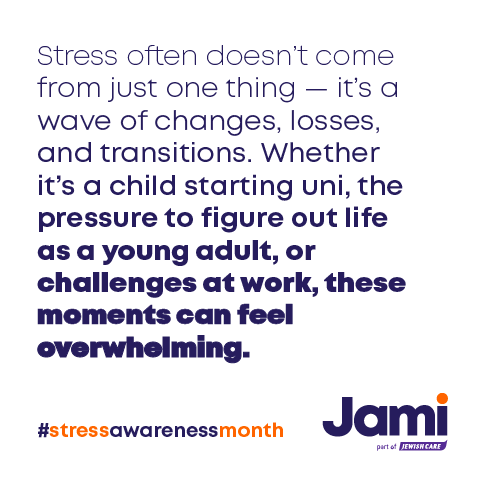
This article was written by Kooth, the digital platform that delivers Jami Qwell online counselling.
Stress is our body’s reaction to feeling threatened or under pressure. Like most of our emotions, stress has both emotional and physiological components. It is something that most people will experience in their lives at one point or another.
However, stress is also something that is often ignored and overlooked, especially when it comes to physical health. This may be because as a society, we sometimes see stress as an indicator of hard work, and, as a result, a “normal” part of everyone’s life.
Now, whilst it is true that there is usually some element of stress in day-to-day life, it is also true that high levels of stress can be very damaging to both physical and mental health. This is particularly true of stress experienced over long periods of time.
Let’s look at the effects of stress on the immune system and see what tips and tricks we have for you to use and share with those around you.
What is an immune system, and how does stress affect it?
Our immune system is the process our body goes through (using specially selected cells) to protect us from physical illness. When we are stressed, our bodies release a hormone called cortisol, and the more stressed we get, the more cortisol our bodies release.
The issue with this is that the cells our bodies use to protect us from illness do not like too much cortisol. And when too much cortisol is released, their ability to protect us from illness is reduced.
Does that mean we will get sick if we are stressed?
High levels or prolonged periods of stress are thought to have negative impacts on the body’s processes and systems. Because of this, research has found links between stress and the experiences of headaches, cardiovascular disease, diabetes, gastric ulcers, asthma, and infectious illnesses like the flu.
Some people seem to be able to function and not get sick from experiencing high levels or prolonged periods of stress. However, for others it can be a real problem. This means it is important to keep an eye on your levels of stress and how long you stay in times of stress. It is also important to pay attention to the different things that make you stressed in your life.
What about coping with stress?
Some people have learned to adapt to stress in a way that means they use it as a driving force. So, for these people, high levels of stress can excite and/or motivate them. Such people would probably say they do not need help coping with stress because they find it helpful.
But for some people, this kind of adaptation is not helpful, and high levels of stress exacerbate other conditions they may have. Often, for people who have health conditions and/or have experienced trauma in their lives, their bodies have adapted to become highly aware of stress. This is to protect the person from the negative consequences that stress would have on their pre-existing issues.
Some people have adapted in a way that means what was once stressful no longer feels stressful, because that level of stress has become their normal.
Some may cope with stress by finding things to distract them from stress, such as drinking alcohol, smoking, or taking drugs. In these cases, the coping mechanisms chosen can have worse effects on the person’s physical and mental health than the stress itself, and the ill effects can be doubled when combined with the consequences of the stress, too.
There are a whole host of ways people cope with stress, and we want to give you an overview of a few, to get you thinking.
What tips and tricks might help me manage stress in my life?
Again, there is a whole host of things people can do to manage stress. We have created a sequence of things that you might find helpful below.
Do a stress audit – Take some time to make a note or pay attention to how many things in your life right now cause you stress.
Pay attention to your stress levels – This is similar to the tip above. Paying attention to how stressed you feel at regular points in the day and/or throughout a week or month is very important. This is where you will get more of an indication of what stress feels like for you, and what’s causing it.
Get familiar with your stress – Take some time to reflect on how you know when you are stressed. Ask yourself questions like, In what ways (subtle or obvious) does my body and mind let me know that I am stressed? Does my home environment change in any way when I am stressed?
Do a stress evaluation – Once you have an indication of what is causing your stress, have a look to see if any of those things can be adapted or changed to be less stressful.
Check out things that lift your mood – Have a think about the things that make you feel even the tiniest bit better in life. Can you use any of those to help you manage the stress you are feeling? Can any of those become a stress outlet for you?
Talk to a professional – If you need further help and support. It can be helpful to talk to a professional.
Where can you look for extra support?
Jami is the mental health service for the Jewish Community. If you need support or are supporting someone who needs help, visit https://jamiuk.org/get-support/ or contact 020 8458 2223.
If you are struggling to cope or need immediate help, contact Shout’s 24/7 crisis text service. Text Jami to 85258 for free, confidential support.
For free, safe and confidential online counselling and emotional wellbeing services for adults, contact Jami Qwell at https://www.qwell.io/jami


